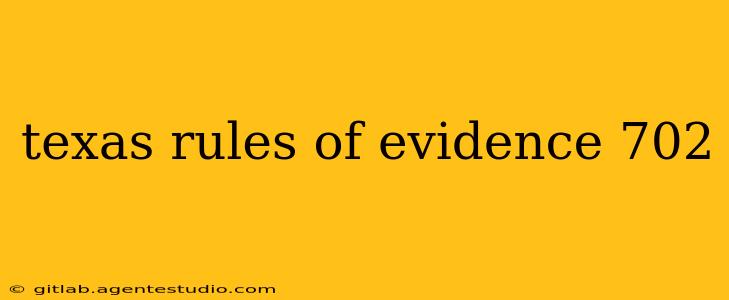Texas Rule of Evidence 702 governs the admissibility of expert testimony in Texas courts. Understanding this rule is crucial for both attorneys and anyone involved in legal proceedings where expert opinions are presented. This guide will break down Rule 702, explaining its requirements and offering practical examples.
What is Rule 702?
Rule 702 states that a witness who is qualified as an expert by knowledge, skill, experience, training, or education may testify in the form of an opinion or otherwise if:
(1) the expert's scientific, technical, or other specialized knowledge will help the trier of fact to understand the evidence or to determine a fact in issue; (2) the testimony is based on sufficient facts or data; (3) the testimony is the product of reliable principles and methods; and (4) the expert has reliably applied the principles and methods to the facts of the case.
Breaking Down the Requirements of Rule 702
Let's delve into each of the four requirements:
1. Helpful to the Trier of Fact
The expert's testimony must assist the judge or jury in understanding the evidence or determining a fact in dispute. This means the expert's knowledge must be beyond the common understanding of the average person. For example, a medical doctor's testimony on the cause of a specific injury would likely be helpful, while testimony on the obvious fact that a broken bone is painful might not be.
2. Sufficient Facts or Data
The expert's opinion must be grounded in sufficient facts or data. This means the expert must have a reasonable basis for their opinion, relying on information obtained through proper investigation and analysis. This could include firsthand observations, reports, tests, or other relevant data. A mere speculation or hunch is insufficient.
3. Reliable Principles and Methods
The expert's testimony must be based on reliable scientific, technical, or other specialized principles and methods. This is where the "Daubert Standard," while not explicitly named in Rule 702, plays a significant role. The court assesses the reliability of the methodology used by the expert, considering factors such as:
- Testing: Has the technique been tested?
- Peer Review: Has the technique been subjected to peer review and publication?
- Error Rate: What is the known or potential error rate of the technique?
- Acceptance: Is the technique generally accepted within the relevant scientific community?
- Methodology: Is the methodology sound and replicable?
4. Reliable Application of Principles and Methods
The expert must reliably apply the chosen principles and methods to the specific facts of the case. Simply using a reliable method doesn't guarantee admissibility if the expert misapplies it or fails to adequately consider relevant facts. The expert's analysis must be thorough and consistent with the accepted standards of their field.
Examples of Expert Testimony Under Rule 702
- Medical Malpractice: A medical doctor testifies about the standard of care and whether a doctor deviated from that standard, leading to injury.
- Auto Accidents: An engineer testifies about the cause of an accident based on vehicle damage and accident reconstruction techniques.
- Product Liability: An expert testifies about a product's design flaws and how those flaws caused an injury.
- Forensic Science: A forensic scientist testifies about DNA evidence or fingerprint analysis.
Challenges to Expert Testimony Under Rule 702
Attorneys can challenge the admissibility of expert testimony by arguing that it fails to meet one or more of the requirements of Rule 702. Common challenges include:
- Lack of Qualification: The expert lacks sufficient knowledge, skill, experience, training, or education to offer an opinion on the subject matter.
- Insufficient Basis: The expert's opinion is not based on sufficient facts or data.
- Unreliable Methodology: The expert's opinion is based on unreliable scientific, technical, or other specialized principles or methods.
- Irrelevant Testimony: The expert's testimony doesn't assist the trier of fact in understanding the evidence or determining a fact in issue.
Conclusion
Texas Rule of Evidence 702 plays a critical role in ensuring the reliability and relevance of expert testimony presented in court. Understanding its requirements is crucial for anyone involved in litigation where expert opinions are likely to be presented. This involves careful evaluation of the expert's qualifications, methodology, and application of principles to the facts of the case. Challenges to expert testimony under Rule 702 are frequent and require a thorough understanding of the rule and relevant case law.

